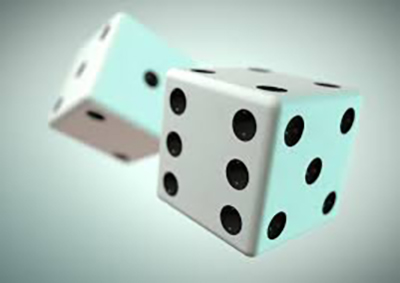Playing Dice with God
by Richard Clarke (Dominican Publications. €10.00 / £8.50)
Richard Clarke, who was born in 1949, is a retired Irish Anglican Archbishop and author. From 2012 to 2020, he served as the Archbishop of Armagh and Primate of All Ireland,
A long varied and distinguished career in the Church of Ireland, which included a time at St Bartholomew’s in Dublin, as well as a succession of posts rising to Dean of Cork, Bishop of Meath and Kildare, and eventually Archbishop of Armagh.
Clearly a man of energy with a mission, he is now devoting his retirement (at least in part) to writing. He has already And Is It True? (2000), The Unharmonious Blacksmith (2002), A Whisper of God (2006), and Shouldering the Lamb: Reflections on an Icon (2017).
In the preface to his latest book, he begins by musing on the remark attributed to Albert Einstein that “God does not Play Dice” – to express his own thoughts on the role of chance and necessity in the working of the universe, and in a more intimate way, in the running of our own lives.
He develops these views in 12 chapters that follow. He makes striking use of poets throughout, starting with R. S. Thomas, a pastor of the Church of Wales, who when asked whether he believed in a God and what kind of God it might be, remarked “He’s a poet who sang the Creation and He’s also an intellect with an ultra-mathematical mind who formed the entire universe in it.”
On this Clarke comments that, “And herein is surely the core of mature religious belief, a narrow corridor to be negotiated between absolutes and imprecision.” One might wonder though if those seeming “imprecisions” arise from our inability to fully penetrate all the mysteries of both the universe and of humanity.
But uncertainty is a theme at the heart of this book. The argument is that life is an adventure, in the original sense of a setting out like a Columbus of the spirit, onto the sea of both the unknown and the unknowable. He suggests that rather than fearing that ocean of faith, those sandbars of doubt, we might in time reach a new world, but perhaps not one we could ever have imagined.
We have to play dice with God and our faith, rather than be satisfied with a self-obsessed wager on our own survival beyond this life”
So this is an interesting read, filled with many allusions to ideas and authors of all kinds, as to fully occupy a reader for some time. It is, as his friend Brendan Leahy, the Bishop of Limerick, remarked “a journey of exploration to the heart of reality”. The book runs to 97 pages, and one feels in places that Dr Clarke might have let himself expand more on his ideas,
If the aim of philosophy as it appeared to many Greeks was to ‘Know thyself’, the aim of spiritual exploration might be to know thyself and God.
“We can never hope,” he concludes, “to grow into what St Paul calls the full stature of Christ” if we are so unsure of ourselves or our faith that we refuse to set out into deep water, the great adventure of living faith. Hence we have to play dice with God and our faith, rather than be satisfied with a self-obsessed wager on our own survival beyond this life.”
This is a short, but effective book, which might well, over the bleak months of winter, provide insights into the possibilities of a new spring.


 Peter Costello
Peter Costello
